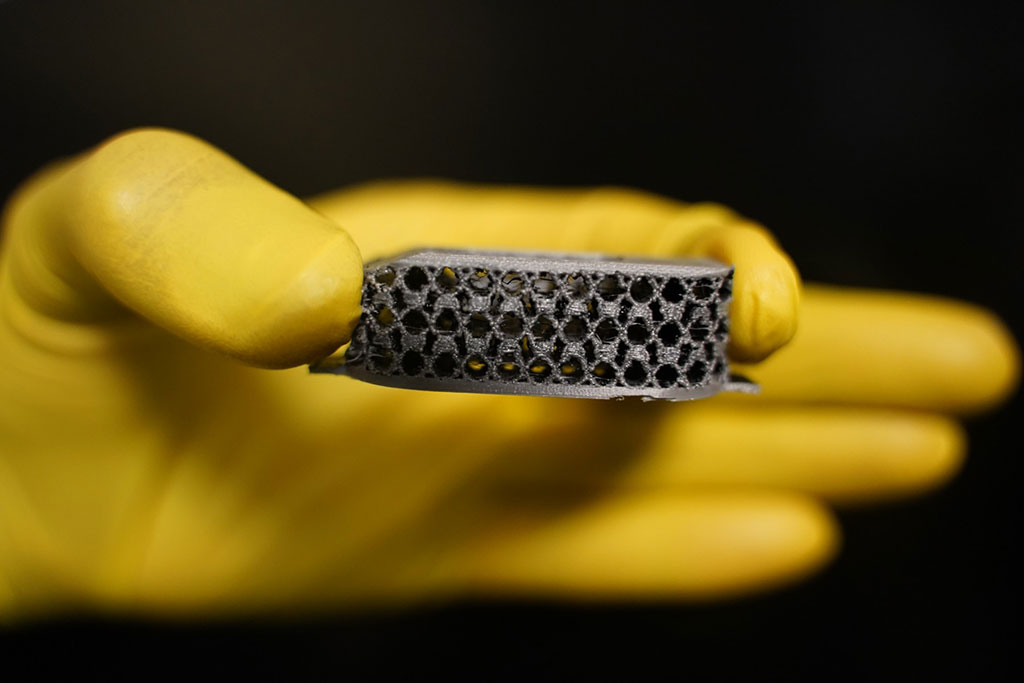Self-Powered Smart Implants for Spinal Fusion Surgery Monitor Healing
|
By HospiMedica International staff writers Posted on 27 Jun 2022 |

Spinal fusion - fusing two vertebrae together - can treat a wide variety of spinal disorders. Often, surgeons will use a cage to provide support where the disk once was between the vertebrae. But what if those cages could support the spine’s healing in more ways than one? Now, researchers are creating patient-specific 3D-printed smart metamaterial implants that double as sensors to monitor spinal healing.
Researchers at the University of Pittsburgh (Pittsburgh, PA, USA) have developed a new class of multifunctional mechanical metamaterials, which act as their own sensors, recording and relaying important information about the pressure and stresses on its structure. The so-called “meta-tribomaterials” a.k.a. self-aware metamaterials, generate their own power and can be used for a wide array of sensing and monitoring applications.
The material is designed such that under pressure, contact-electrification occurs between its conductive and dielectric microlayers, creating an electric charge that relays information about the condition of the material matrix. In addition, it naturally inherits the outstanding mechanical tunability of standard metamaterials. The power generated using its built-in triboelectric nanogenerator mechanism eliminates the need for a separate power source, and a tiny chip records data about the pressure on the cage, which is an important indicator of healing. The data can then be read noninvasively using a portable ultrasound scanner.
Not only is the proposed cage unique in its sensing capabilities, but it’s also made of a highly tunable material that can be customized to the patient’s needs. The researchers have successfully tested the device in human cadavers and are looking to move on to animal models next. Because the material itself is incredibly tunable and scalable, the smart sensor design could be adapted to many other medical applications in the future, like cardiovascular stents or components for knee or hip replacements.
“Spinal fusion cages are being widely used in spinal fusion surgeries, but they’re usually made of titanium or PEEK polymer materials (a semi-crystalline, high-performance engineering thermoplastic) with certain mechanical properties,” said Amir Alavi, assistant professor of civil and environmental engineering at the University of Pittsburgh. “The stiffness of our metamaterial interbody cages can be readily tuned. The implant can be 3D-printed based on the patient’s specific anatomy before surgery, making it a much more natural fit.”
“This is a first-of-its-kind implant that leverages advances in nanogenerators and metamaterial to build multifunctionality into the fabric of medical implants,” added Alavi. “This technological advancement is going to play a major part in the future of implantable devices.”
Related Links:
University of Pittsburgh
Latest Surgical Techniques News
- Minimally Invasive Endoscopic Surgery Improves Severe Stroke Outcomes
- Novel Glue Prevents Complications After Breast Cancer Surgery
- Breakthrough Brain Implant Enables Safer and More Precise Drug Delivery
- Bioadhesive Sponge Stops Uncontrolled Internal Bleeding During Surgery
- Revolutionary Nano Bone Material to Accelerate Surgery and Healing
- Superior Orthopedic Implants Combat Infections and Quicken Healing After Surgery
- Laser-Based Technique Eliminates Pancreatic Tumors While Protecting Healthy Tissue
- Surgical Treatment of Severe Carotid Artery Stenosis Benefits Blood-Brain Barrier
- Revolutionary Reusable Duodenoscope Introduces 68-Minute Sterilization
- World's First Transcatheter Smart Implant Monitors and Treats Congestion in Heart Failure
- Hybrid Endoscope Marks Breakthrough in Surgical Visualization
- Robot-Assisted Bronchoscope Diagnoses Tiniest and Hardest to Reach Lung Tumors
- Diamond-Titanium Device Paves Way for Smart Implants that Warn of Disease Progression
- 3D Printable Bio-Active Glass Could Serve as Bone Replacement Material
- Spider-Inspired Magnetic Soft Robots to Perform Minimally Invasive GI Tract Procedures
- Micro Imaging Device Paired with Endoscope Spots Cancers at Earlier Stage
Channels
Critical Care
view channel
AI Heart Attack Risk Assessment Tool Outperforms Existing Methods
For decades, doctors have relied on standardized scoring systems to assess patients with the most common type of heart attack—non-ST-elevation acute coronary syndrome (NSTE-ACS). The GRACE score, used... Read more
'Universal' Kidney to Match Any Blood Type
Blood-type incompatibility has long been one of the greatest obstacles in organ transplantation, forcing thousands of patients—particularly those with type O blood—to wait years longer for compatible donors.... Read morePatient Care
view channel
Revolutionary Automatic IV-Line Flushing Device to Enhance Infusion Care
More than 80% of in-hospital patients receive intravenous (IV) therapy. Every dose of IV medicine delivered in a small volume (<250 mL) infusion bag should be followed by subsequent flushing to ensure... Read more
VR Training Tool Combats Contamination of Portable Medical Equipment
Healthcare-associated infections (HAIs) impact one in every 31 patients, cause nearly 100,000 deaths each year, and cost USD 28.4 billion in direct medical expenses. Notably, up to 75% of these infections... Read more
Portable Biosensor Platform to Reduce Hospital-Acquired Infections
Approximately 4 million patients in the European Union acquire healthcare-associated infections (HAIs) or nosocomial infections each year, with around 37,000 deaths directly resulting from these infections,... Read moreFirst-Of-Its-Kind Portable Germicidal Light Technology Disinfects High-Touch Clinical Surfaces in Seconds
Reducing healthcare-acquired infections (HAIs) remains a pressing issue within global healthcare systems. In the United States alone, 1.7 million patients contract HAIs annually, leading to approximately... Read moreHealth IT
view channel
Printable Molecule-Selective Nanoparticles Enable Mass Production of Wearable Biosensors
The future of medicine is likely to focus on the personalization of healthcare—understanding exactly what an individual requires and delivering the appropriate combination of nutrients, metabolites, and... Read moreBusiness
view channel
Philips and Masimo Partner to Advance Patient Monitoring Measurement Technologies
Royal Philips (Amsterdam, Netherlands) and Masimo (Irvine, California, USA) have renewed their multi-year strategic collaboration, combining Philips’ expertise in patient monitoring with Masimo’s noninvasive... Read more
B. Braun Acquires Digital Microsurgery Company True Digital Surgery
The high-end microsurgery market in neurosurgery, spine, and ENT is undergoing a significant transformation. Traditional analog microscopes are giving way to digital exoscopes, which provide improved visualization,... Read more
CMEF 2025 to Promote Holistic and High-Quality Development of Medical and Health Industry
The 92nd China International Medical Equipment Fair (CMEF 2025) Autumn Exhibition is scheduled to be held from September 26 to 29 at the China Import and Export Fair Complex (Canton Fair Complex) in Guangzhou.... Read more














